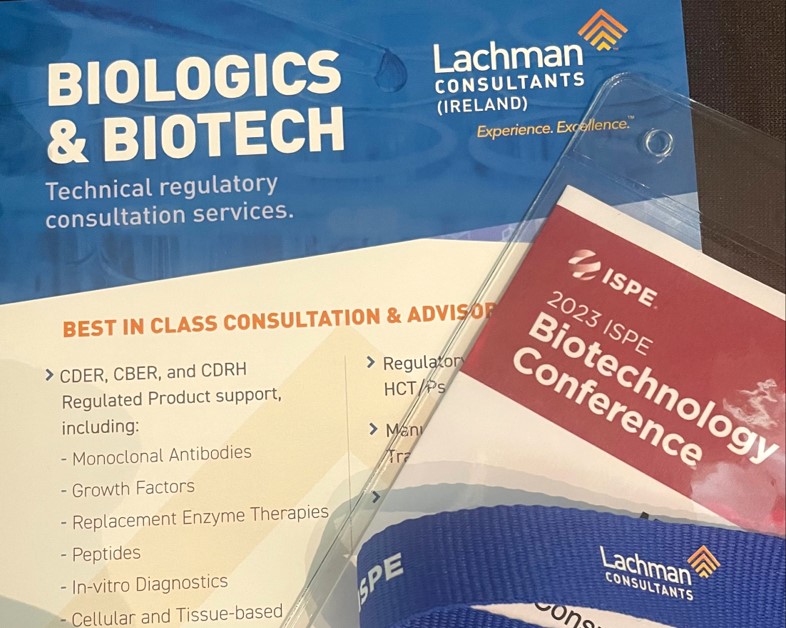The ISPE 2023 Biotechnology Conference was held from 26 to 27 June in Dublin, Ireland. Much of the focus of the conference was Cell and Gene Therapy and Advanced Therapy Medicinal Products (ATMPs), terms used in the US and EU for a range of emerging therapies and products in various stages of development. At the recent ISPE conference, there was representation from FDA, HPRA (Health Products Regulatory Authority) and EMA (European Medicines Agency).
Evdokia Korakianiti, Head of Quality and Safety of Medicines at EMA presented on “Patient Access through Innovation” noting that the EU strategy is to make innovative manufacturing methods and new and more effective medicines a priority matter between now and 2025. The overarching goal of the EU strategy is to enhance access, availability and affordability of medicines and new, innovative products are key to that strategic success.
A dedicated working group within EMA, the Quality Innovation Group (QIG) has been established to support companies as they look to translate their scientific and clinical knowledge into products which can be feasibly manufactured with appropriate levels of adherence to regulatory compliance. This expert group is focusing on three principal areas: a predictable and robust regulatory framework, knowledge exchange between regulators and industry, and regional convergence. Much work is planned in each of these focus areas and, in particular, harmonized regulatory approaches was a particularly positive point for the audience in attendance.
Peter Marks M.D., Director of the Center for Biologics Evaluation and Research spoke about “The Importance of Manufacturing in the Development of Advanced Therapeutics.” He noted that the experience of COVID-19 has presented much support for advanced manufacturing applications, particularly with respect to Cell and Gene Therapy. He noted that one of the rate-limiting steps in the delivery of COVID-19 vaccine deployment was process development and scale-up. He stated clearly that advanced manufacturing techniques would improve agility, reliability and scale-up, particularly in relation to gene therapies, which may lead to cost efficiencies. Coupled with real time data analytics and the evolution of personalized medicine, advanced manufacturing practices could lead to the speedier introduction of life saving medicines. He noted, however, that gene therapy is at a critical crossroads due to manufacturing challenges, the time for clinical development and a lack of concurrence on regulatory requirements globally. He closed optimistically, noting that “advanced manufacturing offers potential for improved agility, flexibility, reliability and cost reduction for the manufacturing of complex biological products.”
On Day Two, Paul Sexton, GMP Policy Manager at HPRA spoke about “Regulation of ATMP Manufacture.” He gave some background to the inspection history within this therapeutic area and some of the common deficiencies the inspectors are seeing (aseptic practice, open and manual processing, contamination risk, as well as poor documentation practices) and focused particularly on handling OOS and the subsequent disposition of OOS products.
He moved to the forward-looking elements of proposals for the revision of pharmaceutical legislation Regulation 726/2004 and Directive 2001/83/EC, focusing on the proposals for decentralized manufacture which would enable MIA holders to have a number of registered manufacturing sites local to patients, as well as discussing proposals with regard to application processes and inspection process within the EU. He concluded with an overview of manufacturing activity in Ireland and throughout the EU, noting that the scope and potential for growth in this cutting-edge sub-sector of the pharmaceutical industry was significant.
These were just some of the many keynote speakers over the two days, but it was positive to hear that regulators are eager to make pathways to manufacture of life saving, innovative products as smooth as possible and are ready and willing to work with industry to achieve this. If your firm needs advice or is thinking of entering the European market, Lachman is there for you. We have recently opened an office in Dublin and have a long history of assisting clients in Europe. Our Ireland office website is https://lachmanconsultants.ie/ or reach out to us at query@lachmanconsultants.com.




